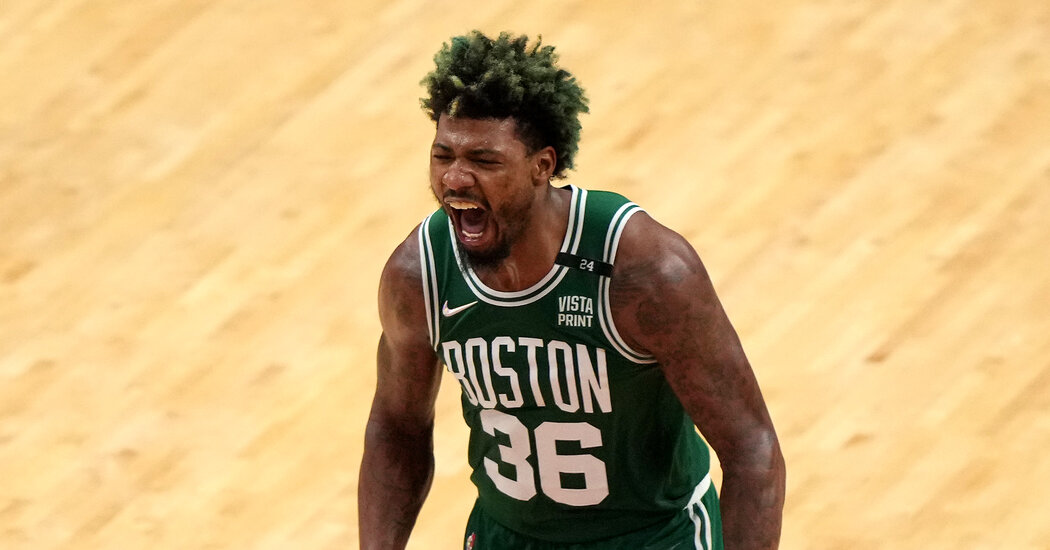
Boston Celtics guard Marcus Smart had an open lane for an easy fast-break basket. Then he unnecessarily moved the ball behind his back and flubbed a layup.
A minute later, he had the ball again and hit an acrobatic circus shot on the baseline from behind the backboard. He drew a foul, too.
That was the Marcus Smart Experience in a nutshell on Thursday night: sometimes ugly, sometimes entertaining, always impactful. In Game 2 of the Eastern Conference finals, Smart had 24 points, 9 rebounds and 12 assists in a game the Celtics thoroughly dominated, 127-102, to tie the best-of-seven series. He had only a single turnover in one of the best playoff performances of his career.
This season has seen the continuation of a remarkable shift for the 28-year-old Smart: There’s a lot less ugly. He’s emerged as a steady, reliable point guard who can more than competently run Boston’s offense, even as his efforts on the other end of the floor — he was named the N.B.A.’s defensive player of the year — draw the most attention.
Smart missed the first game of the series on Tuesday because of a foot sprain, and his absence was evident. The Celtics collapsed in the third quarter, when Smart’s talents for calming the offense down and anchoring the defense could have changed the game.
Right from the opening tip on Thursday, Smart affected the game. The Celtics first scored off a difficult cross-court pass from Smart to shooting guard Jaylen Brown. Smart immediately followed that with a harder-than-it-looked alley-oop to center Robert Williams III.
In the first half, though, Smart shot a dismal 2 for 11 from the field. For most players, that would mean they were having a bad game. But Smart was one of the best players on the court, because of his seven assists and zero turnovers. The Celtics led by 25 at halftime, and they had outscored the Heat by 26 points with Smart on the floor.
“I’m not the type of coach that wants to call a play every time down,” Celtics Coach Ime Udoka said. “I leave it in his hands, and he usually makes the right decision.”
Smart did not enjoy the same kind of trust earlier in his career. In the previous seven years of his N.B.A. journey, all with Boston, Smart was known mostly as a stalwart defensive player with a penchant for throwing up bad shots early in the shot clock and for making ill-advised passes. He was also, for the most part, a poor shooter from 3-point range. Smart had other attributes that made him a fan favorite, however, such as his willingness to constantly dive to the floor for loose balls.
This year, despite his perceived offensive limitations, Smart was handed the keys to the Celtics offense for the first time. It was a risky decision. Smart had never been a starting point guard for a whole season. He had never even been a full-time starter until the 2020-21 season. He had played behind star point guards like Kemba Walker and Isaiah Thomas, two former All-Stars who had made their living as scorers. But Walker’s injuries last year gave Smart a chance a get a taste of being the main point guard.
Smart initially struggled adjusting to his new role, as did the rest of the Celtics. In his first 50 games this season, Smart averaged 11.7 points and 5.3 assists. Boston’s offense often looked stuck in the mud. After a November loss to the Chicago Bulls, Smart incurred the ire of his teammates when he publicly criticized the two best players on the team, Brown and Jayson Tatum, for not passing the ball more. Smart’s underwhelming point guard play contributed to Boston’s lackadaisical 25-25 start.
But then came the turnaround. In Smart’s final 21 games of the regular season, he averaged 13.2 points and 7.1 assists on 43.2 percent shooting. He also morphed into a more reliable shooter. While there were certainly other factors, Smart’s improvement coincided with the Celtics’ surge from fringe playoff team to N.B.A. finals contender. Tatum said Thursday that Smart had given the Celtics “another guy who can handle the ball under pressure and get us organized and get us in position where we need to be.”
His strong playmaking has carried over into the playoffs. In the first round against the Nets, Smart averaged 16.5 points and 7 assists in Boston’s four-game sweep. Against the Milwaukee Bucks in the second round, Smart averaged 14 points and 5.7 assists, while shooting 39.4 percent from behind the 3-point line.
“Being the point guard that I am, I take a lot of pressure off our guys so they don’t have to try to force it as much so they can be who they are,” Smart said after Thursday’s game.
This is all while Smart has often been tasked with guarding the opposition’s best players. In the first round, those were Kevin Durant and Kyrie Irving. He followed that up by switching between Giannis Antetokounmpo and Jrue Holiday in the second round. Against Miami, Smart was asked to try to slow down Jimmy Butler on Thursday night.
Smart increasingly has found himself rescuing the Celtics with his offense as well as his defense. When the Heat were making a third-quarter run in Game 2, it was Smart who took it upon himself to stop it. In addition to his circus shot over the backboard, Smart hit multiple 3s to stop the bleeding. He scored 11 points in the quarter, including the highlight of the game. The Heat had cut the lead to 17 and the Miami crowd was suddenly re-engaged. Smart dribbled the ball up, bounced a crossover dribble between his legs, causing Heat forward Max Strus to tumble backward to the floor. As he scrambled to his feet, Smart calmly stepped forward and made a free-throw line jumper.
That was the new Marcus Smart Experience. Undisturbed under pressure. Reliable. And still entertaining.
“That’s what I got drafted here to do, and I just waited my turn,” Smart said. “And I’m blessed to be in this situation and to have the opportunity to go out and show what I can do. And I think everybody in the organization — in the world — has seen what I can do at that point guard position.”




